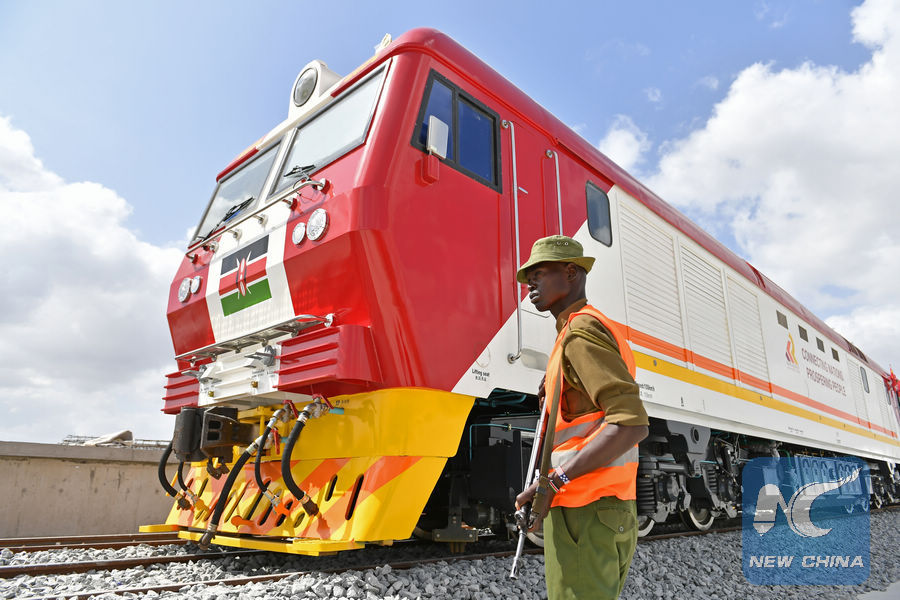
A man stands guard during the reception ceremony of the first batch of locomotives for the Mombasa-Nairobi standard gauge railway in Mombasa, Kenya, on Jan. 11, 2017. (Xinhua/Sun Ruibo)
by Chrispinus Omar
NAIROBI, April 21 (Xinhua) -- Kenya's business environment is set to change radically with the expected launch of the first phase of the Chinese-funded Standard Gauge Railway (SGR) in June and the opening of the first berth at the second port of Lamu in 2018, a Kenyan investment official has said.
Kenya Investment Authority (Ken-Invest) CEO Moses Ikiara said Kenya was gearing up for the arrival of mega-investors, including an auto company that hopes to set up an operating hub in Nairobi.
"These are indeed very exciting times for our country," Ikiara told Xinhua in an interview, without naming the company due to regulatory procedures.
Ikiara said with the first berth at the second port of Lamu ready for use in 2018 and the government still working towards a preferential arrangement for large investors seeking to use Kenya as a regional manufacturing hub, the investment body was under pressure to improve services.
The Kenyan government released a draft Kenya Investment Policy for March for public scrutiny on April 3, promising to create a single stop for all investors.
"We hope to have established the one stop Kenya investment Centre by end of April. The government has already done the nominations for 11 key institutions which would form part of our investment interactions," Ikiara said.
According to the official, the completion of the China-funded railway project would ease the flow of freight from the port of Mombasa to the manufacturing hubs.
The added advantage in logistics would enable companies operating in the country to produce at more affordable costs.
"We have managed to reduce the amount of time a container used to cross from the port of Mombasa from 24 days to just six days. We hope to do even better from June when the SGR project becomes operational," Ikiara said.
Kenya hopes the completion of the first phase of the SGR, which would greatly increase the speed at which freight moves, would cut the cost of freight transportation by a massive 40 percent, Ikiara said.
"We are discussing a range of issues to improve our investment climate. We are contemplating reducing the minimum capital requirement for local investors. This will encourage more local investors to come on board," Ikiara said.
Kenyan officials readily admit that the high cost of energy and the lack of preferential arrangements have made it more difficult for Kenya to compete for large investors.
Kenya has lowered the cost of electricity for large-scale investors from a high of 0.16 U.S. dollars per kilowatt hour to 0.12 dollars with plans to further cut the price to just 0.7 dollars.
Meanwhile, Kenya is progressing with efforts to implement its grand vision of setting up Special Economic Zones.
The government is expected to soon announce the appointment of the Chief Executive Officer of the Special Economic Zones, a new industrial park which would help advance manufacturing.
With the new measures announced, Ikiara said the East African nation believes its ranking on the World Bank's Ease of Doing Business Survey would improve from 114, but only if further measures are also in place to ease the doing business environment for the Small and Medium Enterprises (SMEs).
Under the new arrangements, Kenya plans to increase the level of private investment in relation to the GDP to 24 percent in 2020 and to 32 percent by 2030.
The government also hopes to increase the level of manufactured products locally to 20 percent of the GDP.
These measures would help the country achieve its dream of a regional manufacturing hub, soon to be supported by an upcoming oil and gas industry, according to government officials.
"We want market entry to be easy and transparent. We are working on good logic and a series of incentives which would be based on conditions being met by foreign investors, such bigger tax incentives to foreign investors with bigger local investment partners," Ikiara said.

